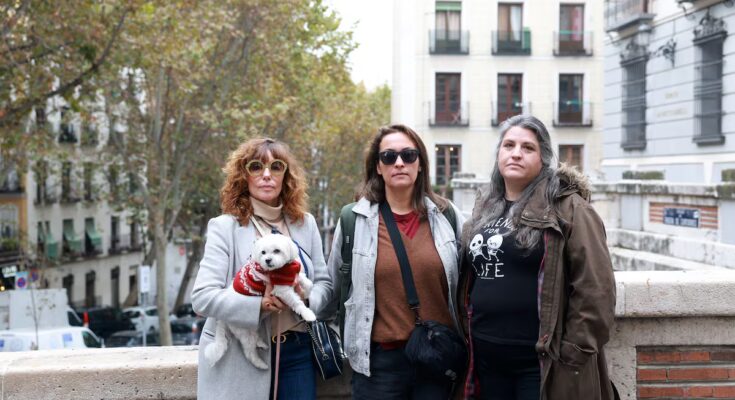The scene of large groups of tourists strolling with suitcases through the streets of Tirso de Molina or Lavapiés has become a common sight for residents. Some go to hotels, others to hostels, but a significant number go to tourist apartments that they book on applications like Airbnb. Lola Martín is the owner of one of these, located in the center of the capital. He regrets that the Reside Plan, among other things, prohibits tourist accommodation from being housed in buildings in the center of the capital where neighbors also live, which, he assures, “benefits large owners and vulture funds” who buy entire blocks. “They have given away the tourist business to entire buildings. They take small owners out of the market and aggravate the housing problem, as these funds evict many neighbors. They are looking for a scapegoat, which is us.”
Ana Pavón is the owner of a tourist apartment in the Latina neighborhood and, like Lola Martín, is part of the VUT Madrid collective, which brings together small owners and managers of tourist apartments. Pavón believes that the Reside Plan is “a law that aims to eliminate competition” and agrees with Martín when he underlines that the City Council “favors large owners”. “We’re normal people renting for normal people,” he says. But the City Council says the aim is not to eliminate tourist apartments, but to ensure that the business is carried out in buildings intended exclusively for tourist rental. They also insist that this plan aims to protect residential housing, neighbors and promote long-term rentals, as well as organize tourist apartments.
According to the Reside Plan, which came into force on September 4 after its approval in an extraordinary plenary session with the favorable votes of the PP, by an absolute majority, apartments that do not comply with the new rules will receive an immediate closure order. If they don’t carry it out, they risk an initial fine of 30,000 euros, which doubles if they continue with the activity and reaches 100,000 if they persist.
For tourist apartments located outside the Central District, the new legislation provides that only those with independent access to the ground or first floor can be licensed. Pavón regrets that the City Council “changed the rules in the middle of the game” and assures that the decrease of 2,662 tourist apartments since July – announced by the City Council on November 11 and based on a study by the Inside Airbnb platform (which collects the number of adverts on said site) – is due to the tiredness of the owners. Sources in the urban planning area indicate that the decline corresponds to illegal apartments without authorization.
“We are going through a very bad time with the issue of fines. The Municipality shows itself as if it is doing something good, but it is an expropriation. They are bringing the owners to ruin just by renting out their house”, says Pavón before explaining what, in his opinion, is the real reason for the decline announced by the Consistory: “The deleted adverts come from defenseless people and they feel persecuted. They ban the activity of me, who am the mother of a family and my economy depends on it, so that vulture funds can do business with entire buildings.”
What the municipal executive presents as a shield for housing and for the neighbors does not seem to please the latter either. Luis Miguel García, 70, is a resident of Lavapiés and runs La Scarpa d’Oro. From his small business he has witnessed how the neighborhood has transformed over the last 50 years. “Whole families have left here. Because of gentrification and tourism, people who have (rented) apartments will do very well,” he comments. But he highlights a side effect: “Traditional commercial premises are disappearing because a tourist apartment is a better deal.”
García says his business has endured because he has been able to adapt. The same did not happen with those that have already disappeared and that he remembers exactly from a long time ago on Sombrerete Street: a candy factory, a landfill, a mattress shop, a horse meat shop, a grocery store, a sewing machine shop, a pottery, a shoemaker, a bakery and a wine shop that sold wine in amphorae. Now hairdressers, greengrocers and call shops are proliferating. “They are spread out like mushrooms,” he observes.
Another resident of Lavapiés, owner of a nearby shop, who prefers to remain anonymous, agrees with him. From behind the counter he assures that more than half of the people walking in the area are tourists, before pointing the finger at municipal policies: “I have neighbors who rent their houses on Airbnb and they feel guilty. If only neighbors who need money or can’t find work did it, but there were no vulture funds, I think it wouldn’t be a problem. The powerful let themselves take over the business and then start to prohibit it, but in reality by doing this they hurt those who survive.”
This situation extends to other areas of the capital such as the Vallecas neighborhood. Carmen has been running a herbalist’s shop for 40 years and remembers the phrase she heard, not long ago, from one of her customers: “I have to leave my house because they will sell the whole block to make tourist apartments.” Carmen supports maintaining the essence of Vallecas, although she sees it as complicated by gentrification. “I would like to maintain the integrity and characteristics that existed before in Vallecas. Tourists don’t come to buy the usual things, neither from the glassmaker nor from the herbalist. This closes the businesses. The tourists are passing through.”
The Reside Plan also met opposition in Cibeles Palace. The PSOE lodged an appeal against it, which was admitted to the Superior Court of Justice of Madrid (TJSM) on 17 October. The socialists agree with the neighbors and small owners, reporting it as “a tool to favor the business of large investors, who can finance the transformation of almost all the residential buildings in the entire city of Madrid, favoring the expulsion of its current residents”.
Added to this is the one presented by Más Madrid on November 3rd before the Chamber of the TJSM for a Plan Reside which the group’s interim spokesperson, Eduardo Rubiño, renamed “Plan Expulsa” because, in his opinion, “it rolls out a red carpet for vulture funds and only intends to empty the city center to transform it into a gigantic hotel”.
Noise and coexistence, for example, are some of the most frequent complaints. Lola Martín and Ana Pavón, owners of tourist apartments, say they have not had problems with neighbors for renting the houses, as they have established strict rules so that tourists respect the space and do not cause discomfort. If they don’t comply, they say, they will go out on the streets. Maripaz Barosen, manager of tourist apartments and also a member of VUT Madrid, says the situation has forced her to look for a second job to make ends meet, and warns: “People don’t realize that they kick out the tenant, they transform the whole building, but that building will never be a home again.”



